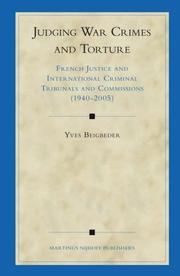| Listing 1 - 3 of 3 |
Sort by
|

ISBN: 1281400009 9786611400002 904741070X 9789047410706 9004153292 9789004153295 Year: 2006 Publisher: Leiden Nijhoff
Abstract | Keywords | Export | Availability | Bookmark
 Loading...
Loading...Choose an application
- Reference Manager
- EndNote
- RefWorks (Direct export to RefWorks)
Even democracies commit war crimes. France, like other democracies, has not always kept up to the high standards expected from the „homeland of human rights”. Its colonial past shows that what it termed its “civilizing mission” was tainted with military, economic and religious abuses, denounced by a few courageous groups and individuals, and revealed in a few public trials. The Vichy government’s willing participation in Jewish persecution during the German occupation of France was ignored or denied until trials (Barbie, Touvier, Papon) brought to light these unpleasant facts in the 1990's. France’s participation in the Nuremberg and Tokyo Tribunals was relatively minor but useful. However, its participation in later international tribunals (Ex-Yugoslavia, Rwanda) revealed a few conflicts between French politics and the work of these tribunals. France’s participation in the International Criminal Court is also reviewed. These developments show that even democratic countries, like France but not France alone, can commit war crimes, crimes against humanity and even be accomplices in genocides. Reasons include pressures in exceptional periods of internal and/or external political/military tensions, nationalist policies, lack of judiciary independence, and lack of media exposure to abuses. However, past crimes must be recalled and exposed, particularly if they have been hidden, covered by amnesties, and not judicially punished. They must be visible as part of a country’s history in order to ensure that they are not repeated.
Kriegsverbrechen. --- Strafgerichtsbarkeit. --- Tribunal. --- Verbrechen gegen die Menschlichkeit. --- Völkerstrafrecht. --- War crimes. --- Crime --- Internationaler Strafgerichtshof (Körperschaft) --- Geschichte 1940. --- Frankreich. --- Crimes against humanity --- Crimes against humanity. --- International crimes. --- Crimes, International --- International crime --- International offenses --- International crimes --- Genocide --- War crimes --- Law of armed conflicts. Humanitarian law --- Criminal law. Criminal procedure --- France
Book
ISBN: 3839428505 3837628507 9783839428504 Year: 2015 Publisher: Bielefeld transcript Verlag
Abstract | Keywords | Export | Availability | Bookmark
 Loading...
Loading...Choose an application
- Reference Manager
- EndNote
- RefWorks (Direct export to RefWorks)
Muss ein Staat seine Untaten bereuen, um außenpolitische Legitimität zu erhalten? Was bedeutet es, Kriegsverbrechen aufzuarbeiten? Und wie agieren und kommunizieren Politiker, die unter internationalem Druck aufarbeiten müssen? Am Beispiel des serbischen Umgangs mit während der Jugoslawienkriege begangener Kriegsverbrechen sucht Daniela Mehler Erklärungen für Politikwandel und Ambivalenzen. Sie rekonstruiert die serbischen Aufarbeitungsdebatten vom Beginn der Jugoslawienkriege bis zur Verhaftung von Ratko Mladic und stellt die Positionen und Norminterpretationen der serbischen Akteure vor. Besprochen in: Wissenschaft & Frieden, 4 (2015) Portal für Politikwissenschaft, 18.02.2016, Holger Niemann
Yugoslav War, 1991-1995 --- Serbs --- Atrocities. --- History --- Serbians --- Serbo-Croatians --- Servians --- Ethnology --- Balkan. --- Conflict Studies. --- European Politics. --- International Relations. --- Memory Culture. --- Milosevic. --- Mladic. --- Norms. --- Political Science. --- Politics. --- Srebrenica. --- Transitional Justice. --- Violence. --- War Crimes. --- War. --- Yugoslavia. --- Serbien; Aufarbeitung; Kriegsverbrechen; Jugoslawien; Transitional Justice; Balkan; Krieg; Milosevic; Mladic; Srebrenica; Normen; Gewalt; Politik; Erinnerungskultur; Konfliktforschung; Internationale Politik; Europäische Politik; Politikwissenschaft; Serbia; War Crimes; Yugoslavia; War; Norms; Violence; Politics; Memory Culture; Conflict Studies; International Relations; European Politics; Political Science
Book
Year: 2022
Abstract | Keywords | Export | Availability | Bookmark
 Loading...
Loading...Choose an application
- Reference Manager
- EndNote
- RefWorks (Direct export to RefWorks)
In 1918 according to the interior ministry in Vienna of the Republic of Austria there was no ‘Gypsy mischief’ anymore. The criminalization of poverty and the assumption about destitute persons would endanger the public order and security climaxed a new dimension in World War One, when more than one million refugees from the war zones arrived in the western regions of Austria-Hungary or were evacuated by the military forces. Following the internment camps for refugees and ‘political suspicious’ civilians, a ‘Gypsies camp’ was built in Hainburg an der Donau. Das Wiener Innenministerium der Republik Österreich ging 1918 davon aus, dass die ‚Zigeunerfrage‘ im Zuge des Ersten Weltkriegs gelöst worden sei. Die Kriminalisierung von Armut und die Annahme, dass Mittellose eine Gefährdung für die öffentliche Ordnung und Sicherheit darstellen würden, nahmen im Ersten Weltkrieg eine neue Dimension an, als über eine Million Flüchtlinge aus den Kriegsgebieten in den Westen Österreich-Ungarns kamen oder von den Militärbehörden evakuiert wurden. Infolge der Internierung von Flüchtlingen sowie von ‚politisch verdächtigen‘ Zivilisten und Zivilistinnen wurde das ‚Zigeunerlager‘ in Hainburg an der Donau errichtet.
World War One, Austria-Hungary, internment camps, ‘Gypsies’, war crimes, Roma, Sinti, police, population policy, criminology, anthropology, ethnology, racism, statistics --- à FOS 2012 -- HUMANITIES (6) -- History, Archaeology (601) -- History, Archaeology (6010) -- Modern history (601014) --- à FOS 2012 -- HUMANITIES (6) -- History, Archaeology (601) -- History, Archaeology (6010) -- Austrian history (601016) --- à FOS 2012 -- HUMANITIES (6) -- History, Archaeology (601) -- History, Archaeology (6010) -- European history (601005) --- Erster Weltkrieg, Österreich-Ungarn, Internierungslager, ‚Zigeuner‘, Kriegsverbrechen, Roma, Sinti, Polizei, Bevölkerungspolitik, Kriminalwissenschaften, Kriminologie, Anthropologie, Ethnologie, Rassismus, Statistik --- à FOS 2012 -- GEISTESWISSENSCHAFTEN (6) -- Geschichte, Archäologie (601) -- Geschichte, Archäologie (6010) -- Neuere Geschichte (601014) --- à FOS 2012 -- GEISTESWISSENSCHAFTEN (6) -- Geschichte, Archäologie (601) -- Geschichte, Archäologie (6010) -- à sterreichische Geschichte (601016) --- à FOS 2012 -- GEISTESWISSENSCHAFTEN (6) -- Geschichte, Archäologie (601) -- Geschichte, Archäologie (6010) -- Europäische Geschichte (601005)
| Listing 1 - 3 of 3 |
Sort by
|

 Search
Search Feedback
Feedback About UniCat
About UniCat  Help
Help News
News